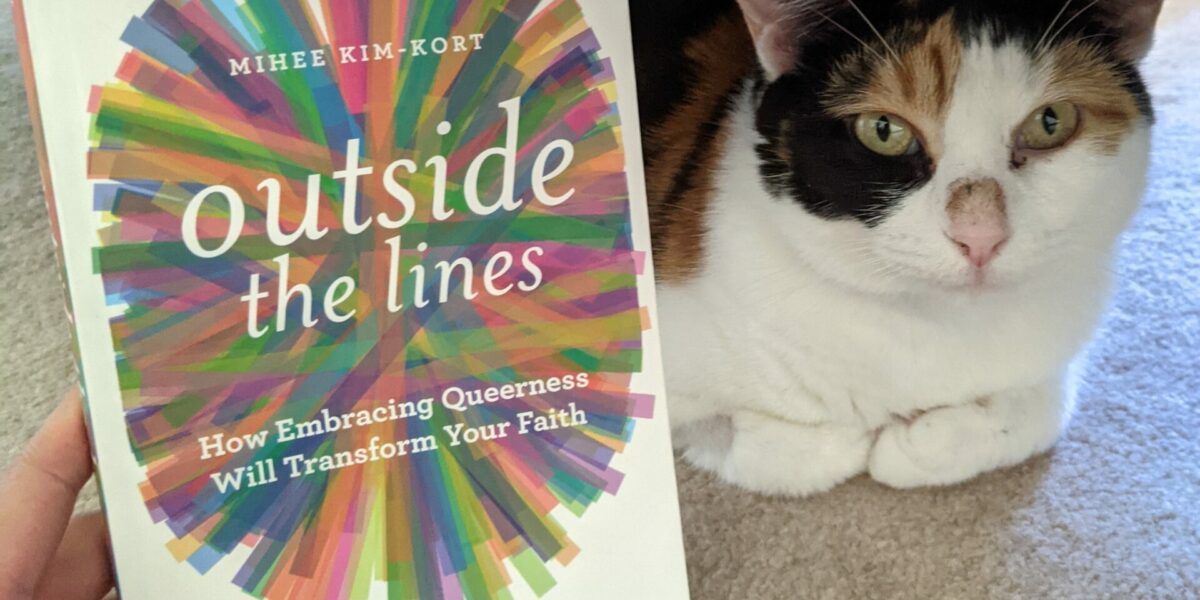Outside the Lines by Mihee Kim-Kort

Reviewed by Ethan C.
“Outside the Lines: How Embracing Queerness Will Transform Your Faith” by Mihee Kim-Kort is a book that I never thought I would read. Yet I really enjoyed this book, and how it challenges the notion of normal, to see the world from a different lens, a queer lens, and how that is a lens that would help us transform how we see Jesus and our life right now. Mihee Kim-Kort is genuine, honest and real with the reader, and shares her own life experiences, her challenges, and also what she has learned over her many years being a daughter, minister, wife and mother as a Korean woman, growing up in a traditional Korean household. Topics of this book include: purity culture, family, church, friendship, evangelical church, race, LGBTQ+, whiteness, embodiment, work and play, and how the queering and/or challenging of all these different areas of our life are really interconnected and matter a lot to how we live out our faith. If you are even slightly curious about any of these topics, I highly suggest you read this book. Here are four excerpts from the book I really like:
“Jesus the Christ, the carpenter from Galilee, was viewed as a radical and confronted traditions and institutions. He implicitly and organically lived, ministered, and died in such a way that he was grounded in his context as a first-century Jew yet challenged the racial, sexual, cultural, religious, and economic realities and more around him. He did so with a compelling fervor and creative brilliance, undoing the structures and systems with a mere parable or blessing, a touch or gesture. Finally, he himself was undone on the cross. Jesus acted queerly. Certainly, we could describe his actions as the dictionary definition of queer, “strange or odd from a conventional viewpoint; unusually different.” Yet he doesn’t merely act queer. He enacts and embodies queerness. Jesus is queer.” -pg5
“I always tell people that marriage taught me more about ministry than any seminary class. Marriage has taught me more about an individual’s vulnerability and need, that each person has good and bad, and that each person is complicated. But during this most recent decade, my friendships have taught me that romance is not the be-all and end-all, and that a queer spirituality can change the substance of all our relationships, but we can still find romance and romantic partners to share intimacy with a popular bullet vibrator and other toys. “Friendship,” writes Mary Hunt, “includes love and power, embodiment and spirituality.” Friendship recognizes that there are boundaries and borders and walls around people. Connection – whether platonic or romantic or intimate -happens when each person consents to allow the other to permeate those lines, whether in physical or emotional ways. It might be a touch, embrace, caress, or simple recognition. These connections are intertwined, and they manifest in unique combinations within each individual friendship.” – pg139
“I received a postcard from the group Queer Theology, and on the front it says, “Christianity has always been queer.” It was a timely reminder that Christianity has actually always contended with notions of purity through queerness. From its beginnings, Christianity was characterized by transgressive encounters, the crossing of boundaries – an offensive intermingling, whether it involves temple meat or worship, multiple ethnicities and identities, and friendships that extend beyond the norm. A queer spirituality today continues that legacy by challenging and dismantling the kind of purity that locks people out, locks people in their bodies, or locks people out of the fullest expression of faithfulness we are called to and created for in God. A queer spirituality says, “To hell with your purity,” because purity doesn’t define love or value, no matter how pretty and shiny you make it. Purity doesn’t define or indicate faith or faithfulness or the nature of God’s covenant with us. Purity doesn’t define goodness or holiness, and it isn’t a measure of salvation.” pg 172
“A queer spirituality gives us a way to live out these relationships more courageously, more openly, more meaningfully, with a different kind of joy and hope. We can live with the realization that there is no guarantee and not everything lasts forever, but what we make of our time, and with whom, matters. Queering intimacies means I can make that choice, and I do every day – to love and be loved. “
Tags: Christian Living / Spiritual Growth (LIV or DEV), ethan c, mihee kim-kort
*Disclaimer: Individual reviews are the reviewer’s own personal opinions and may not necessarily represent Mennonite Brethren doctrine or be in accordance with the Mennonite Brethren Statement of Faith (https://www.mennonitebrethren.ca/mb-convictions/the-mb-confession-of-faith-detailed-edition/).